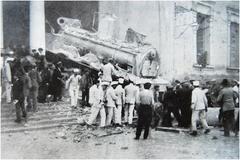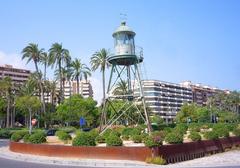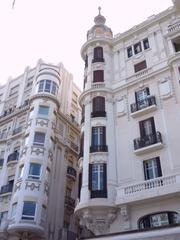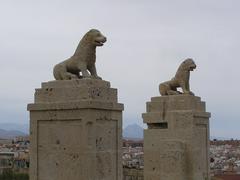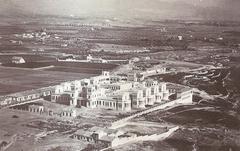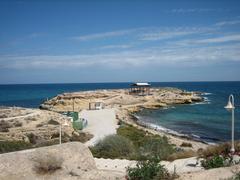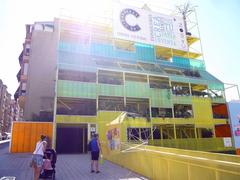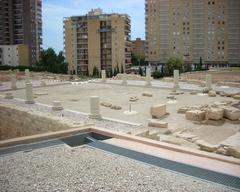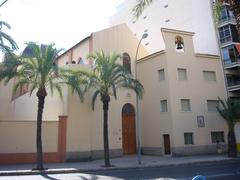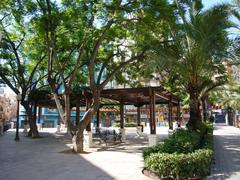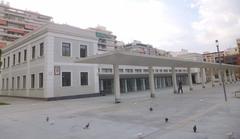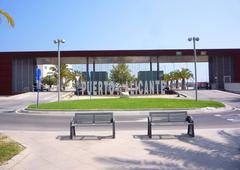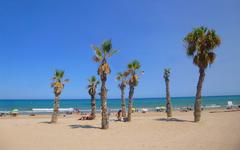Visiting MARQ - Museo Arqueológico de Alicante: Hours, Tickets, and Tips
Date: 17/07/2024
Introduction
The Museo Arqueológico de Alicante, commonly known as MARQ, stands as a testament to the rich and diverse archaeological heritage of Alicante, Spain. Established in 1932 and later relocated to a beautifully renovated 1920s hospital building, MARQ offers visitors a journey through time, showcasing artifacts from prehistoric eras to the modern age. The museum’s architectural blend of neoclassical and modernist elements, combined with its award-winning modern renovation, makes MARQ not just a center of historical exploration but also an architectural gem (MARQ official website). With an array of permanent and temporary exhibitions, MARQ provides an immersive experience through its interactive displays, multimedia presentations, and virtual reality stations. This guide aims to provide comprehensive information on visiting MARQ, including its history, exhibits, visitor information, and nearby attractions, ensuring a memorable visit for history enthusiasts and casual tourists alike.
Table of Contents
- Introduction
- History and Significance of MARQ
- Collections and Exhibits
- Visitor Information
- Technological Innovations
- Educational and Cultural Impact
- Community Engagement and Outreach
- Visitor Amenities
- Safety and Health Measures
- Nearby Dining and Accommodation
- Special Events and Guided Tours
- FAQ
- Conclusion
History and Significance of MARQ
Origins and Establishment
Established in 1932 and originally housed in the Provincial Palace, MARQ was created to preserve and showcase the archaeological heritage of the Alicante region. The collection, initially comprising artifacts from local excavations, reflects the diverse historical influences that have shaped the area over millennia. In 2000, the museum was relocated to its current site, a former hospital building from the 1920s, as part of a modernization initiative.
Architectural Significance
The building housing MARQ is an architectural gem, blending neoclassical and modernist elements. Originally a hospital, it was carefully renovated to preserve its historical integrity while incorporating contemporary design features. This transformation earned MARQ several awards, including the European Museum of the Year Award in 2004.
Collections and Exhibits
MARQ’s collections span from prehistoric times to the modern era, with notable highlights including:
Prehistory Hall
Featuring tools, pottery, and artifacts from the Paleolithic, Neolithic, and Bronze Ages, the Prehistory Hall offers insights into early human societies’ daily lives, rituals, and technological advancements. Notable exhibits include the ‘Venus of Alicante,’ a small figurine believed to be a fertility symbol, and a collection of flint tools that showcase early craftsmanship.
Iberian Culture Hall
Showcasing sculptures, ceramics, and artifacts from the ancient Iberian civilizations, this hall includes the famous Lady of Cabezo Lucero, a beautifully crafted bust exemplifying the intricate sculptural techniques of the Iberians. Interactive displays and multimedia presentations provide context and enhance the visitor experience.
Roman Culture Hall
Offering a glimpse into Roman life in Alicante with mosaics, statues, and everyday objects, the Roman Culture Hall includes a reconstructed Roman kitchen, complete with authentic utensils and food replicas. This hall highlights the profound impact of Roman civilization on the region.
Medieval Hall
Artifacts from the Visigothic, Islamic, and Christian periods reflect the region’s complex history. Key exhibits include Visigothic jewelry, Islamic ceramics, and Christian religious artifacts. The hall also features a detailed model of a medieval castle, providing insights into the architectural and defensive strategies of the time.
Temporary Exhibitions
MARQ is renowned for its dynamic temporary exhibitions, which cover a wide range of archaeological and historical topics. Recent exhibitions have included ‘The Treasures of Tutankhamun’ and ‘The Vikings - Warriors of the North,’ showcasing artifacts from the tomb of the famous Egyptian pharaoh and the history and culture of the Viking people, respectively.
Special Collections
Underwater Archaeology
This collection includes artifacts recovered from shipwrecks and submerged settlements along the Mediterranean coast. Highlights include amphorae used for transporting goods, ancient anchors, and various personal items such as jewelry and coins. Interactive displays explain the techniques and challenges of underwater archaeology.
Numismatics Collection
The Numismatics Collection offers a comprehensive overview of the history of currency in the region, including coins from various periods such as Greek, Roman, Islamic, and medieval times. Notable pieces include a rare gold coin from Emperor Augustus and a series of Islamic dinars.
Visitor Information
Tickets and Visiting Hours
- Tickets: Prices vary; check the official website for the latest rates and potential discounts.
- Visiting Hours: Typically open from 10:00 AM to 7:00 PM, Tuesday to Saturday, and from 10:00 AM to 2:00 PM on Sundays and holidays. Closed on Mondays.
Location and Transportation
MARQ is located at Plaza Dr. Gómez Ulla, s/n, 03013 Alicante, Spain. It is easily accessible by public transport, including tram (Line 2) and several bus lines, such as 02, 23, and 24. For those driving, there is ample parking available nearby.
Travel Tips
- Plan Ahead: Check the museum’s website for special events or temporary exhibitions. Booking tickets in advance can save time and ensure entry during peak periods.
- Allow Enough Time: Allocate at least 2-3 hours to fully appreciate the extensive collections.
- Photography: Allowed in most areas, but flash and tripods are prohibited. Check for specific restrictions in certain exhibits.
Technological Innovations
MARQ employs cutting-edge technology, including interactive displays, multimedia presentations, and virtual reality stations, to enhance the visitor experience and provide immersive explorations of historical environments.
Educational and Cultural Impact
MARQ offers a wide range of educational programs, including guided tours, workshops, lectures, and special events. Collaborations with local universities and research institutions contribute to ongoing archaeological research and scholarship.
Community Engagement and Outreach
The museum organizes public events such as cultural festivals, temporary exhibitions, and family-friendly activities. The annual events calendar is available on the MARQ official website.
Visitor Amenities
Cafeteria
The museum has a cafeteria offering a selection of snacks, beverages, and light meals, perfect for relaxing and recharging during your visit.
Gift Shop
The museum shop sells a range of souvenirs, books, and replicas of artifacts, providing an excellent place to purchase a memento of your visit.
Accessibility
MARQ is fully accessible with ramps, elevators, and accessible restrooms. The museum also offers audio guides and tactile exhibits for visitors with visual impairments, as well as sign language interpretation for guided tours upon request.
Safety and Health Measures
Enhanced cleaning protocols, social distancing measures, and the use of face masks may be required in indoor spaces, depending on current health guidelines. For the latest information, refer to the museum’s health and safety page.
Nearby Dining and Accommodation
Dining
The area around the museum offers a variety of dining options, from traditional Spanish tapas bars to international cuisine. Popular nearby restaurants include La Taberna del Gourmet and El Portal Taberna & Wines.
Accommodation
There are numerous hotels and guesthouses within walking distance of the museum. Highly-rated options include the Hotel Hospes Amérigo and the Melia Alicante.
Special Events and Guided Tours
MARQ often hosts special events, including lectures, themed tours, and family-friendly activities. Guided tours are available in multiple languages and can be booked in advance. Check the official MARQ website for the latest updates.
FAQ
What are the visiting hours for MARQ? MARQ is open Tuesday to Saturday from 10:00 AM to 7:00 PM, and on Sundays and holidays from 10:00 AM to 2:00 PM. The museum is closed on Mondays.
How much are tickets for MARQ? Admission fees are €5 for adults, €3 for students and seniors, and free for children under 6. Discounts are available for groups and school visits, and admission is free on the first Sunday of each month.
Is MARQ accessible for visitors with disabilities? Yes, MARQ is fully accessible with ramps, elevators, and accessible restrooms. The museum also offers audio guides, tactile exhibits, and sign language interpretation upon request.
Are there any special events at MARQ? Yes, MARQ hosts special events including lectures, themed tours, and activities for families. Check the official MARQ website for the latest updates.
Conclusion
MARQ is more than just a museum; it’s a journey through time, offering a captivating look at the rich history and culture of Alicante. Whether you’re exploring the permanent exhibitions, special collections, or participating in educational programs, MARQ provides an enriching and unforgettable experience. Plan your visit today and discover the treasures of Alicante’s premier archaeological museum.
For more information, visit the official MARQ website.
References
- Discover MARQ - Alicante’s Premier Archaeological Museum - Visiting Hours, Tickets, and More, 2024, MARQ official website
- Explore MARQ - Museo Arqueológico de Alicante - Visitor Information, Tickets, and Tips, 2024, MARQ official website
